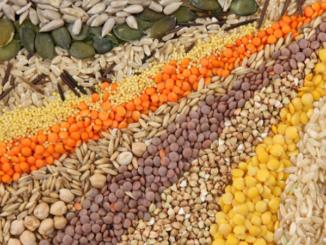
As the dust settles after the elections, what will the Commission focus on? Which politicians have secured the key roles? Who is at the helm in shaping agricultural and environmental policy over the next 5 years? News round up from Brussels by Natasha Foote.
Informal centre coalition sees Von der Leyen return
After months of politicking and debates, it’s now confirmed that there will be a familiar face at the helm of the Commission over the next 5 year political cycle – Ursula von der Leyen, who led the Commission’s work over the previous mandate.
She might not have quite won all the hearts and minds in the Parliament, but – crucially – the freshly re-elected Commission President officially managed to win the majority of votes of the lawmakers last week.
The outcome was not always a given. Von der Leyen spent most of the year preemptively cosying up to the right ahead of the EU elections, hedging her bets on a swing to the right.
But, as we saw, things did not swing to the right quite as much as feared, meaning that Von der Leyen was still able to patch together a majority – albeit a weak one – with her traditional allies around the centre. To guarantee success, she needed more numbers, either from the right-wing ECR (European Conservatives and Reformists) – which would upset the delicate balance of her current coalition majority – or the Greens – who were decidedly unimpressed with her green ambitions (or lack thereof).
In the end, it was the Greens – not the right – that were the kingmakers, as it was their vote that won the magic majority (360 out of the 720 MEPs) needed for her to secure another round at the top spot. This is because approximately 50 MEPs defected from her traditional allies, most likely from liberals and socialists.
It was a pragmatic decision. It gave the Greens – who suffered significant losses in elections – some power to help sway the agenda, exchanging some key promises, such as green guarantees “to build on the success of the Green Deal, to develop a climate-neutral industrial policy and boost just transition funding” as a condition for their support and, crucially, ensuring a pro-European coalition with the balance of decision making tipped to the left, rather than the right.
“What is crucial is that the majority that holds is the majority of pro-European Groups in this House. We need to keep the far-right from getting into power,” co-president of the Greens Terry Reintke said at Von der Leyen’s hearing, despite admitting that she could not call Von der Leyen’s agenda “green “.
Some have warned however that the Greens gave a ‘blank check’ to von der Leyen, pointing out that her political priorities are closer to the EPP (European People’s Party) than anybody else on the centre left. Meanwhile, commentators point out that the Greens did not secure a formal coalition agreement, and so will have limited capacity to hold von der Leyen accountable on her promises.
“Despite its pro-EU, progressive appearances, the new von der Leyen Commission will be a centre-right / right-centre Commission – possibly the first one ever -, which will be both culturally and politically more attuned to Meloni’s ECR and Orban’s Patriots than to the Greens,” academic and legal expert Alberto Alemanno warned following the vote, calling the win a “pyrrhus victory” for the EU project.
Time will tell to what extent Von der Leyen keeps true to her word – but if the last mandate is anything to go by, in which many of the promised green ambitions either failed to materialise or were thrown out the window, the outlook doesn’t look all that rosy.
So what can the agrifood sector expect from Von der Leyen?
The freshly re-elected Commission President has already given us a few concrete promises and hints for her vision for the next few years of agricultural policy in her Parliamentary hearing as part of her bid for the top spot.
First, she promised to present a Vision for Agriculture and Food in the first 100 days looking at how to ensure the long-term competitiveness and sustainability of our farming sector within the boundaries of our planet.
She remained vague on details as this will be based on the outcomes of the Strategic Dialogue on Food, the closed door group of a mix of agrifood stakeholders convened by Von der Leyen to overcome the polarisation in the sector and feed into the future path for the sector. The outcomes can be expected by mid-September, according to a Commission source – so that’s something to look forward to after the break.
The Commission President also promised to ensure farmers’ fair incomes. Although gave no details on how this could be done, she did stress that “nobody should be forced to sell high quality foodstuffs at below production costs”.
Perhaps with a nod to the quagmire passing new GMO/NGT legislation has become, she “will propose a new European Biotech Act in 2025” – “in order to make it easier to bring biotech from the laboratory to factory and then onto the market”.
Meanwhile, she announced a plan to tackle “adaptation to climate change” in the EU agrifood sector, as well as a strategy on managing water resources.
Despite a spate of rollbacks in the EU’s farming policy programmes von der Leyen also assured that her flagship European Green Deal – the EU’s plan to become carbon neutral by 2030 – was not dead.
“We must and will stay the course on all of our goals, including those set out in the European Green Deal,” her 2024-2029 political priorities read.
Things will get a bit clearer in terms of direction over the next few months, which will see von der Leyen start to form her inner circle – the team of Commissioners charged with particular portfolios.
Although we don’t yet know which country will take which policy area, there are rumours abounding in Brussels that the top agri job may well go to either Luxembourg or Austria.
What we do know is that half of the new College of Commissioners (13) will be EPP, and mostly in charge of key portfolios. The rest will be a mix of the other flavours, including ECR, but there will be no Green Commissioner, concreting a solid centre-right majority within the College.
Despite talk that there may be a new European Vice President overseeing work on food, this was not announced by the Commission President.
Commissioner hearings will take place in September / October to officially sign off the candidates, while the new Commission will officially form around November, kicking off with the publication of the Commission’s work programme which will set out the EU executive’s plans for new policy and legislative initiatives.
And what about over in the Parliament?
Over in the Parliament, groups have dusted off their sorting hats to place the new batch of MEPs into different houses – the ‘Parliamentary committees’, which do the grunt work negotiating technical files before they’re passed to a full-house vote in the plenary sessions.
The big news here is that ECR gets agriculture. Despite much noise about being ‘the farmer’s party’, EPP will not in fact chair the agriculture committee. Instead, and despite talk of an informal coalition of S&D, Renew, EPP and Green, Veronica Vrecionová of ECR gets this agenda-setting position.
The Czech politician says she will focus on “better conditions for family farmers and small and medium farmers” and the need to “massively reduce red tape”. She adds: “the whole common agricultural policy has to reflect the fact that we have started accession dialogue with Ukraine. I personally will focus on animal welfare”.
MEPs also elected Daniel Buda (EPP, RO), Norbert Lins (EPP, DE), Eric Sargiacomo (Socialists and Democrats, S&D, FR) as Vice-Chairs. The 4th Vice-Chair will be elected at a forthcoming meeting – the only spot left to fill in the long list of 20 Committees and 4 sub Committees.
With this one role to fill, the Committee allocations as they stand mean that Greens/EFA has no chair or vice-chair in either AGRI or ENVI.
Despite Vrecionová’s emphasis on small farmers in her first statement, German small farming organisation ABL is exasperated.
In a statement it said that “it is completely incomprehensible that the EPP, which portrayed itself as the patron saint of farmers on the occasion of the farmers’ protests before the election, is now simply handing over the chairmanship of the committee that is most important for Europe’s agriculture and food to the far-right group, of all people.”
It went on: “The challenges of finally enabling fair producer prices while ensuring an intact environment and animal welfare are enormous. The announcements made by Commission President Ursula von der Leyen can and must now be followed by action. The next short-term steps are to implement the ban on the purchase of food below cost price in the UTP Directive and to introduce the obligation for dairy farmers to conclude contracts in the Common Market Organisation of the CAP for all member states.”
Some of the group coordinators were named this week – aka, the groups political leader in each committee.
The centre-right EPP has chosen two seasoned MEPs to lead work in the AGRI and ENVI (Environment) committees: Herbert Dorfmann and Peter Liese, respectively.
Dario Nardella will be the Socialist coordinator in the AGRI committee, while Tiemo Wölken takes the job in ENVI. For the Greens, another familiar face – experienced MEP and farmer Thomas Waitz – will be their agri committee coordinator. Another familiar face will coordinate the liberal group’s work in the Environment committee – French MEP Pascal Canfin.
Stay tuned after summer as ARC will publish a deeper look at who these new faces in the Parliament are and the ones to watch going forward, so stay tuned for that.
(Some) Policy Matters
Alright, enough with the politics – let’s talk policy. What can we expect over the next few months? Well– not too much, in short. There’s always a weird waiting period between the selection of Commission President and her cabinet and the publication of the EU executive’s work programme.
But there are still a few things to watch out for, the first of which are the outcomes from the strategic dialogue, which will help shape the course for the future mandate.
There are also some key files open from the past mandate – namely, the Commission’s plans to loosen rules on new GMO technologies and also on the EU’s overhaul of the seeds regulation. For both, we’re now waiting on the Council to find its position –but don’t hold your breath. The Hungarian’s just took the reins of the rotating EU Presidency from the Belgians, and neither file is high up on their priority list, according to sources.
Despite a senior diplomat saying that work “will continue”, in reality it’s unlikely that anything will move on the NGTs file. “It’s just not a top priority for the Presidency,” one diplomat close to the matter told ARC.
The Presidency also put together a new paper, seen by ARC, which raises a host of issues with the current position on the table – beyond the issue of patents, which has been the main sticking point in discussions in the Council. This includes labelling issues, detection and identification concerns, sustainability and exports, to name a few.
Meanwhile, another source said that the seeds overhaul – the Plant Reproductive Materials (PRM) – is also not prominent on their radar.
Instead, the Hungarians are very keen to get the ball rolling on talks on the next round of the Common Agricultural Policy (CAP) reform, aiming to put together guidelines on the future direction by the end of their turn at the helm of the rotating EU presidency. Likewise, discussions and deliberations will also likely kick off from September in the Parliament on the 2027-2034 reform.
So plenty to sink our teeth into for now – ARC will be here to steer you through all the policy discussions to come as the next mandate kicks off.
More
News Roundup: Brussels plays musical chairs, responsibility reshuffle, and a big week ahead
Will the Nature Restoration Law Decision be Reversed? Not likely – here’s why





